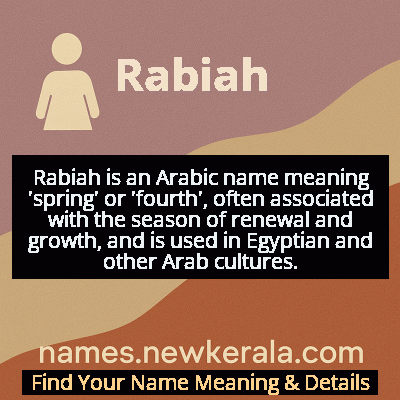Rabiah Name Meaning & Details
Origin, Popularity, Numerology Analysis & Name Meaning of Rabiah
Discover the origin, meaning, and cultural significance of the name RABIAH. Delve into its historical roots and explore the lasting impact it has had on communities and traditions.
Name
Rabiah
Gender
Female
Origin
Egyptian
Lucky Number
3
Meaning of the Name - Rabiah
Rabiah is an Arabic name meaning 'spring' or 'fourth', often associated with the season of renewal and growth, and is used in Egyptian and other Arab cultures.
Rabiah - Complete Numerology Analysis
Your Numerology Number
Based on Pythagorean Numerology System
Ruling Planet
Jupiter
Positive Nature
Optimistic, inspirational, and creative.
Negative Traits
Scattered, exaggerating.
Lucky Colours
Yellow, gold, purple.
Lucky Days
Thursday.
Lucky Stones
Yellow sapphire.
Harmony Numbers
1, 2, 9.
Best Suited Professions
Arts, writing, communication.
What People Like About You
Creativity, optimism.
Famous People Named Rabiah
Rabia al-Adawiyya
Sufi Saint and Poet
Pioneered the concept of divine love in Sufism and authored influential spiritual poetry
Rabia Balkhi
Poet
First known woman to write poetry in New Persian, creating lasting literary legacy
Rabia Chaudry
Attorney and Author
Influential legal advocate and New York Times bestselling author for 'Adnan's Story'
Rabia Kazan
Journalist
Award-winning Turkish journalist known for international reporting and television presenting
Name Variations & International Equivalents
Click on blue names to explore their detailed meanings. Gray names with will be available soon.
Cultural & Historical Significance
Extended Personality Analysis
Women named Rabiah typically exhibit a unique blend of nurturing warmth and intellectual depth that makes them natural leaders and healers in their communities. Their spring-inspired name manifests in personalities that encourage growth in others—they are often described as 'people who help others bloom' through their supportive nature and insightful guidance. Rabiahs tend to possess exceptional emotional intelligence, able to read subtle social cues and provide exactly what someone needs emotionally, whether it's comfort, encouragement, or honest feedback. They often demonstrate remarkable resilience, able to weather personal challenges and emerge stronger, much like perennial flowers that return each spring. Their connection to nature often translates into environmental awareness, artistic appreciation, or careers involving growth and development. While deeply compassionate, Rabiahs also maintain strong personal boundaries and principles, refusing to compromise their core values. This balance of softness and strength makes them respected figures who can navigate complex social dynamics while remaining authentic to themselves.
Modern Usage & Popularity
In contemporary naming practices, Rabiah maintains a distinctive presence that balances traditional roots with modern appeal. While not among the most popular names globally, it holds steady usage in Egyptian and Arab communities where parents value its deep cultural heritage and elegant pronunciation. The name has experienced a slight resurgence among educated urban families in Cairo and Alexandria who appreciate its historical significance without being overtly religious. Internationally, Rabiah appears in Muslim diaspora communities across Europe, North America, and Australia, often chosen by parents wanting to maintain cultural connections while providing their daughters with a name that works well in multicultural settings. Social media and global awareness of figures like Rabia Chaudry have introduced the name to broader audiences, though it remains relatively uncommon outside Muslim populations. Modern nicknames like 'Rabi,' 'Bia,' or 'Rabz' help adapt the name for casual use while preserving its formal dignity. The name's stability in usage patterns suggests it will continue to be a meaningful choice for families seeking names with substance rather than fleeting trends.
Symbolic & Spiritual Meanings
The name Rabiah operates on multiple symbolic levels that enrich its meaning beyond the literal 'spring-born.' As a representation of spring, it embodies the universal themes of renewal, hope, and life's perpetual cycle—symbolizing the ability to begin again after hardship and the promise that darkness always gives way to light. In Islamic symbolism, the association with green (another meaning of rabi) connects to paradise, spiritual vitality, and the living quality of faith. The numerical connection to four represents stability and completeness—the four elements, seasons, directions, and pillars of many spiritual traditions. Mystically, Rabiah symbolizes the soul's journey from dormancy to awakening, from seeking to finding, mirroring the spiritual path of its most famous bearer, Rabia al-Adawiyya. The name also carries feminine symbolism of receptivity and nurturing power—like the earth in spring that receives seeds and brings forth life. Together, these layers create a name that speaks to both earthly existence and spiritual aspiration, practical growth and mystical depth, making it a powerful choice that honors multiple dimensions of human experience.

